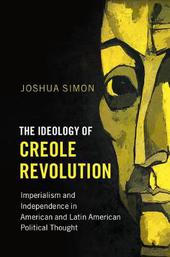
|
The Ideology of Creole Revolution: Imperialism and Independence in American and Latin American Political Thought
Paperback / softback
Main Details
| Title |
The Ideology of Creole Revolution: Imperialism and Independence in American and Latin American Political Thought
|
| Authors and Contributors |
By (author) Joshua Simon
|
| Series | Problems of International Politics |
|---|
| Physical Properties |
| Format:Paperback / softback | | Pages:284 | | Dimensions(mm): Height 226,Width 150 |
|
| Category/Genre | National liberation, independence and post-colonialism
Revolutions, uprisings and rebellions |
|---|
| ISBN/Barcode |
9781316610961
|
| Classifications | Dewey:973.3 |
|---|
| Audience | | Tertiary Education (US: College) | | Professional & Vocational | |
|---|
|
Publishing Details |
| Publisher |
Cambridge University Press
|
| Imprint |
Cambridge University Press
|
| Publication Date |
6 June 2017 |
| Publication Country |
United Kingdom
|
Description
The American and Latin American independence movements emerged from distinctive settings and produced divergent results, but they were animated by similar ideas. Patriotic political theorists throughout the Americas offered analogous critiques of imperial rule, designed comparable constitutions, and expressed common ambitions for their new nations' future relations with one another and the rest of the world. This book adopts a hemispheric perspective on the revolutions that liberated the United States and Spanish America, offering a new interpretation of their most important political ideas. Simon argues that the many points of agreement among various revolutionary political theorists across the Americas can be attributed to the problems they encountered in common as Creoles - that is, as the descendants of European settlers born in the Americas. He illustrates this by comparing the political thought of three Creole revolutionaries: Alexander Hamilton of the United States, Simon Bolivar of Venezuela, and Lucas Alaman of Mexico.
Author Biography
Joshua Simon is Assistant Professor of Political Science at Columbia University, New York. His research focuses on American and Latin constitutions, and approaches to foreign policy. He has also studied American and Latin American adaptations of European traditions of political thought, including republicanism, liberalism, positivism, and Marxism.
Reviews'This remarkable work breaks the artificial barriers dividing North and South American constitutional thought, and confronts the two centuries of dynamic conversation that crosses these frontiers to build a distinctive vision of legitimate government for the Americas. An outstanding achievement.' Bruce Ackerman, Sterling Professor of Law and Political Science, Yale University 'For centuries, sustained by a carefully nurtured belief in the exceptional nature of the founding of the United States, the independence movements in both North and South America have been treated as if they were entirely unrelated, culturally and politically. Joshua Simon has changed all that. He has shown how crucial for the intellectual architects of the revolutions both North and South was the recognition that these were uprisings by descendants of European settlers, appropriating a new world for themselves. This has immense implications not only for our understanding of the revolutions themselves, but also of the subsequent histories of the republics which emerged from them, and why they subsequently followed such seemingly divergent paths. Compelling, passionate, learned and wide-ranging, The Ideology of Creole Revolution is written with elegance and verve.' Anthony Pagden, Distinguished Professor of Political Science and History, University of California, Los Angeles 'Joshua Simon's new book reconceives the US revolutionary experience as one of a series of 'creole' political projects that marked the Americas, more akin institutionally and ideologically to later developments in Venezuela and Mexico than to the traditional European cases. In doing so, Simon beautifully recasts seemingly exceptional characteristics of the US story as part of a broader colonial imagination and shared political fate. The result is a compelling work of historical reconstruction, a powerful reinterpretation of political ideas and figures, and a remarkably useful guide to exploring questions of power and wealth in the present-day Americas. An essential contribution, this is comparative political theory and global history of the very highest order.' Aziz Rana, Cornell University 'With sophisticated textual analysis, historical sensitivity, and stylistic flair, Joshua Simon provides a useful contribution to the growing field of Comparative Political Theory. At last we see clearly the linkages that make the Americas a unified region in terms of political ideas, and which undermine the notion of American exceptionalism. The work is a welcome addition to the historical literature that shows how present US developments are closely connected to the core logic of power made visible through a Latin American lens.' Diego A. von Vacano, Texas A & M University
|